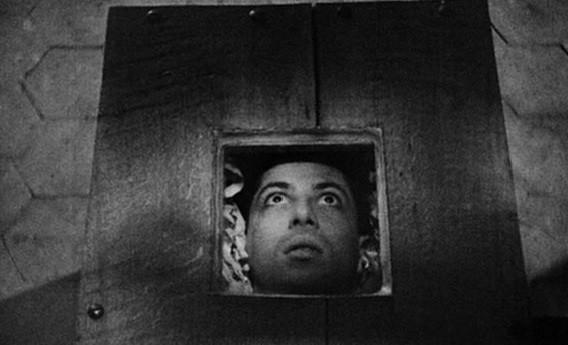Ingmar Bergman’s work, especially of his middle-period in the sixties and seventies, is characterized by a deep psychological focus, a fixation, filtering the rest of the world through a series of close-ups on his characters’ faces (usually Liv Ullman and Max von Sydow). Dark and brooding, it is as if the camera wants to read the very thoughts of the characters, and perhaps even of the actors who play them.
One wouldn’t expect, then, to find Bergman, in this middle-period, to try to tell a sprawling sci-fi horror epic; but that is just what he does in The Serpent’s Egg. A lesser filmmaker might adapt his style to fit the content, but not Bergman. He filters the nightmare world he creates through his sharp, penetrating close-ups and narrow fixation upon a character or two.
In this case, the fixation is almost entirely upon Abel Rosenberg, played by a young, puppyish David Carradine. Rosenberg, a Jewish trapeze artist, is unemployed in 1920s Berlin and spends most of his time drunk. In the midst of this stupor, he witnesses surreal horrors on the street—people being beaten to clean sidewalks, dead horses being stripped of meat—and oddities in cabaret bars, while those near him keep inexplicably dying, usually by suicide.
Entering his life at this time are his deceased brother’s ex-wife, Manuela (Liv Ullman), and a sinister childhood companion, Hans Vergerus, whom Rosenberg despises for reasons he tries to articulate but fails. While Vergerus seems intent on helping Rosenberg and Manuela with housing and employment, Manuela suffers from guilt and a mysterious illness and Rosenberg is drunkenly stumbling ever closer to discovering a conspiracy at work in his life.
The beauty of the film is that, while Bergman focuses, throughout most of the film, solely on the emotional and psychological crises of its Rosenberg and Manuela, and their struggles in the hardships of Berlin, he gradually builds up through inconspicuously delivered information, implication, and subtle alterations in mood a sense of something larger and malevolent in the world around them. Watching it the first time, one could be forgiven for thinking it is a dismal, slightly surreal period drama, with noir influences, until the ending delivers its stunning blow and a re-evaluation of everything that came prior is in order, revealing the horror beneath the surface.
Bergman scholar Marc Gervais argues—I think successfully—that Bergman was trying to create a film about 1920s Berlin by using the very cinematic style of 1920s Germany, to wit, expressionism.
Expressionism, in American cinema, had profound influence over two genres: film-noir and horror. In Germany, it was the default mode for sci-fi and horror. Not surprisingly, The Serpent’s Egg plays in part like a noir, like a sci-fi, and like a horror, always with that form of surrealism unique to expressionism. Although Bergman’s intense study of his characters is dominant, just under the surface of every close-up, two-person conference, or shot of Rosenberg going down an empty street is Scarlet Street (Lang), Metropolis (Lang), and The Cabinet of Dr. Caligari (originally intended for Lang).*
Each time I watch this film, I’m struck by what a remarkable achievement in storytelling and style this is. However, upon first watching, one may well be bored, underwhelmed. With good films, watching is the most important; with great films, re-watching is the most important. The Serpent's Egg is a great film. If you pick this one up on my recommendation, give it a second chance, a third chance, and then it’ll work its magic on you—it’ll shock and chill you.
-
*I wanted to write more about the nature and use of expressionism, noir, and horror in this film, but I can't do so without spoiling the film. So, you'll have to figure that out on your own, I guess.
Help make this site more interesting through discussion:
The Serpent's Egg (1977)
Author: Jared Roberts
Subscribe to:
Post Comments (Atom)


0 comments:
Post a Comment